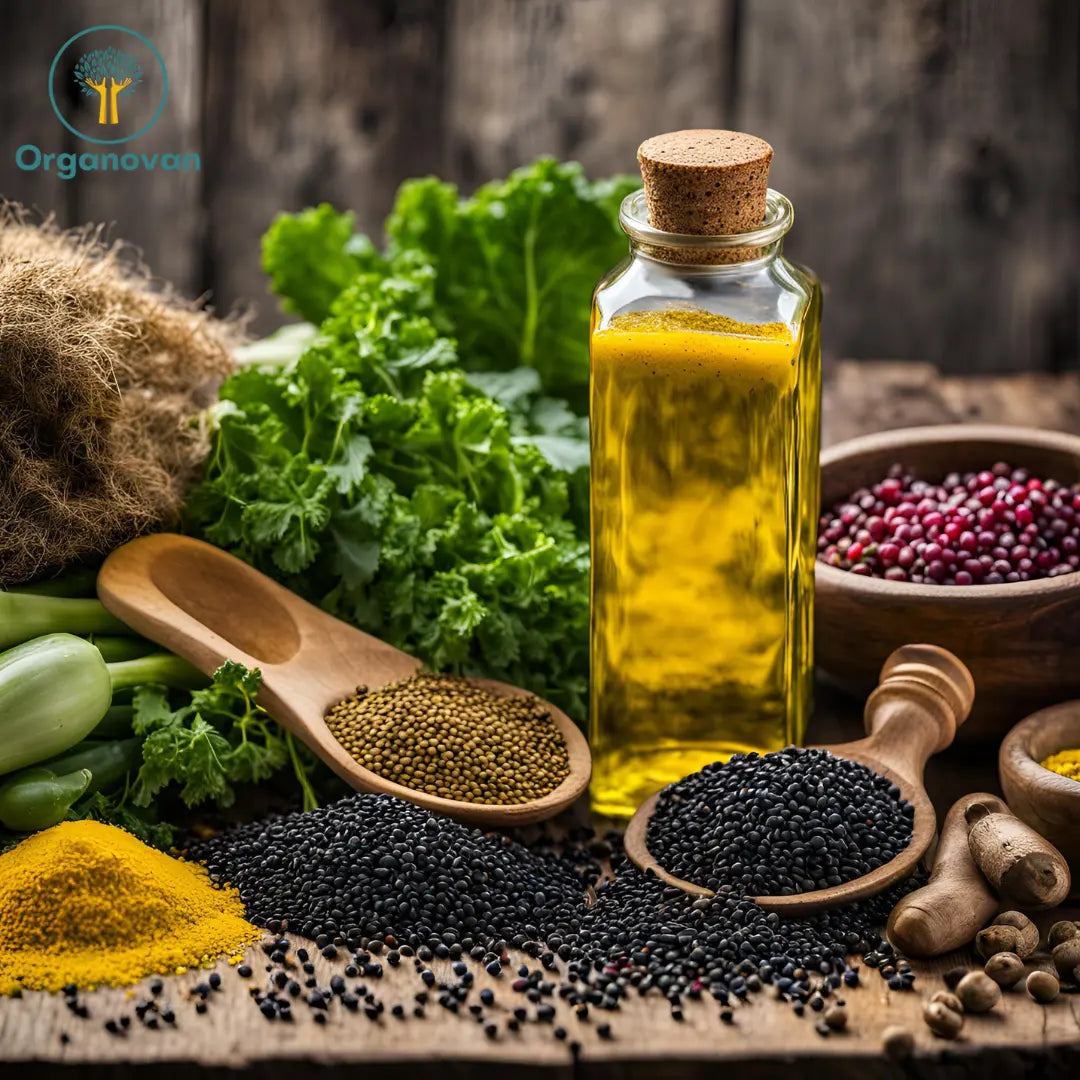
Why Organovan Cold-Pressed Mustard Oil is Healthier Than Ghee?
Share
In the quest for healthier cooking oils, Organovan cold pressed mustard oil has emerged as a front-runner, especially when compared to traditional desi ghee. With the increasing focus on health and nutrition, understanding the benefits of these oils is crucial for making informed dietary choices. This blog will explore why Organovan Cold Pressed Mustard Oil stands out as a healthier option than desi ghee, emphasizing its nutritional benefits, culinary versatility, and overall health impacts.
 vs
vs 
Understanding the Basics
Before delving into the specifics, it's essential to grasp what Organovan cold-pressed mustard oil and desi ghee are.
Organovan Cold-Pressed Mustard Oil: Extracted from mustard seeds without the use of heat, this oil retains its natural flavour, nutrients, and aroma. The cold-pressing process ensures that the oil is rich in essential fatty acids, vitamins, and antioxidants.
Desi Ghee: A form of clarified butter made from the milk of cows or buffaloes. It has been a staple in Indian cooking for centuries, known for its rich flavor and high smoke point.
Nutritional Comparison
Fat Composition
One of the most significant differences between cold-pressed mustard oil and desi ghee lies in their fat composition.
Mustard Oil: Contains a balanced ratio of monounsaturated fats (MUFA) and polyunsaturated fats (PUFA), along with omega-3 and omega-6 fatty acids. These healthy fats are essential for heart health and can help reduce cholesterol levels.
Desi Ghee: While ghee is a good source of saturated fats, excessive consumption can lead to an increase in LDL cholesterol (the "bad" cholesterol).
Vitamins and Antioxidants
Cold-Pressed Mustard Oil: Rich in Vitamin E, an antioxidant that helps protect your cells from damage and supports skin health. It also contains phytonutrients that may have anti-inflammatory properties.
Desi Ghee: Contains fat-soluble vitamins like A, D, E, and K. However, the nutrient density is lower compared to cold-pressed oils, which can provide a broader spectrum of health benefits.
Health Benefits

Heart Health
Research suggests that the consumption of cold-pressed mustard oil can be beneficial for heart health.
Cholesterol Management: Mustard oil helps in managing cholesterol levels due to its favourable fat profile. Regular use can lower the risk of cardiovascular diseases by improving lipid profiles.
Ghee, while beneficial in moderation, may not provide the same heart-healthy advantages as mustard oil, particularly for those with existing heart conditions.
Anti-Inflammatory Properties
Cold-pressed mustard oil is known for its anti-inflammatory properties, making it an excellent choice for those dealing with chronic inflammation.
Mustard Oil: Contains compounds like allyl isothiocyanate, which have been shown to reduce inflammation in the body.
Desi Ghee: Although it has some anti-inflammatory properties, it doesn’t match the potency of mustard oil in this regard.
Digestive Health
The health benefits of mustard oil extend to digestive health as well.
Cold-Pressed Mustard Oil: Can stimulate the digestive system, improve metabolism, and may even help in preventing constipation.
Ghee: Promotes gut health and can aid digestion but is often heavier and may not be as beneficial for everyone.
Culinary Versatility
Cooking Uses
Cold-pressed mustard oil and desi ghee have different culinary applications, which can also influence their health implications.
Mustard Oil: Its strong flavour and high smoke point make it ideal for frying, sautéing, and pickling. It adds a unique taste to dishes while maintaining nutritional integrity during cooking.
Desi Ghee: Known for its rich, buttery flavour, it is often used in traditional Indian sweets and slow-cooked dishes. However, its higher saturated fat content means it should be used sparingly.
Flavour Enhancement
Mustard oil enhances the flavour of food without overpowering it, making it a versatile choice in various cuisines. It complements vegetables, meats, and even salad dressings, adding depth to meals without the heaviness of ghee.
Environmental Impact
In today's world, the environmental impact of food choices is more important than ever.
Sustainability of Mustard Oil: Cold-pressed mustard oil is often produced through sustainable farming practices. Mustard plants require less water compared to dairy farming, making it a more environmentally friendly choice.
Ghee Production: The process of producing ghee involves dairy farming, which has a higher environmental footprint due to methane emissions from livestock.
Conclusion
When comparing **Organovan Cold Pressed Mustard Oil** to desi ghee, the benefits of mustard oil are clear. From its superior fat composition and heart health benefits to its culinary versatility and environmental sustainability, cold-pressed mustard oil stands out as a healthier alternative.
Incorporating mustard oil into your diet can lead to a myriad of health benefits while also enhancing the flavours of your favourite dishes. If you’re looking to make a change in your cooking habits, consider replacing ghee with cold-pressed mustard oil for a healthier and more flavourful option.
As you navigate your cooking choices, remember that the quality of oil matters. Opt for Organovan Cold Pressed Mustard Oil to ensure you're getting the best nutrition and flavour from your oil. Embrace the change, and your body will thank you!
